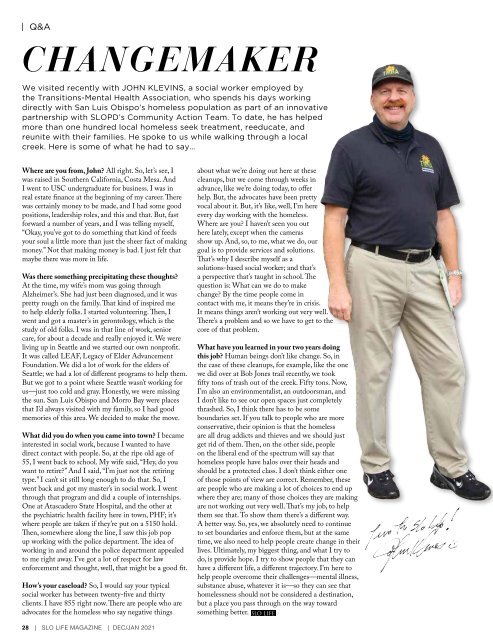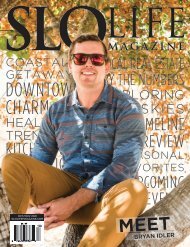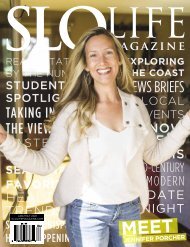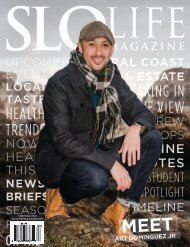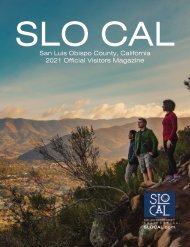You also want an ePaper? Increase the reach of your titles
YUMPU automatically turns print PDFs into web optimized ePapers that Google loves.
| Q&A<br />
CHANGEMAKER<br />
We visited recently with JOHN KLEVINS, a social worker employed by<br />
the Transitions-Mental Health Association, who spends his days working<br />
directly with San Luis Obispo’s homeless population as part of an innovative<br />
partnership with <strong>SLO</strong>PD’s Community Action Team. To date, he has helped<br />
more than one hundred local homeless seek treatment, reeducate, and<br />
reunite with their families. He spoke to us while walking through a local<br />
creek. Here is some of what he had to say…<br />
Where are you from, John? All right. So, let’s see, I<br />
was raised in Southern California, Costa Mesa. And<br />
I went to USC undergraduate for business. I was in<br />
real estate finance at the beginning of my career. There<br />
was certainly money to be made, and I had some good<br />
positions, leadership roles, and this and that. But, fast<br />
forward a number of years, and I was telling myself,<br />
“Okay, you’ve got to do something that kind of feeds<br />
your soul a little more than just the sheer fact of making<br />
money.” Not that making money is bad. I just felt that<br />
maybe there was more in life.<br />
Was there something precipitating these thoughts?<br />
At the time, my wife’s mom was going through<br />
Alzheimer’s. She had just been diagnosed, and it was<br />
pretty rough on the family. That kind of inspired me<br />
to help elderly folks. I started volunteering. Then, I<br />
went and got a master’s in gerontology, which is the<br />
study of old folks. I was in that line of work, senior<br />
care, for about a decade and really enjoyed it. We were<br />
living up in Seattle and we started our own nonprofit.<br />
It was called LEAF, Legacy of Elder Advancement<br />
Foundation. We did a lot of work for the elders of<br />
Seattle; we had a lot of different programs to help them.<br />
But we got to a point where Seattle wasn’t working for<br />
us—just too cold and gray. Honestly, we were missing<br />
the sun. San Luis Obispo and Morro Bay were places<br />
that I’d always visited with my family, so I had good<br />
memories of this area. We decided to make the move.<br />
What did you do when you came into town? I became<br />
interested in social work, because I wanted to have<br />
direct contact with people. So, at the ripe old age of<br />
55, I went back to school. My wife said, “Hey, do you<br />
want to retire?” And I said, “I’m just not the retiring<br />
type.” I can’t sit still long enough to do that. So, I<br />
went back and got my master’s in social work. I went<br />
through that program and did a couple of internships.<br />
One at Atascadero State Hospital, and the other at<br />
the psychiatric health facility here in town, PHF; it’s<br />
where people are taken if they’re put on a 5150 hold.<br />
Then, somewhere along the line, I saw this job pop<br />
up working with the police department. The idea of<br />
working in and around the police department appealed<br />
to me right away. I’ve got a lot of respect for law<br />
enforcement and thought, well, that might be a good fit.<br />
How’s your caseload? So, I would say your typical<br />
social worker has between twenty-five and thirty<br />
clients. I have 855 right now. There are people who are<br />
advocates for the homeless who say negative things<br />
about what we’re doing out here at these<br />
cleanups, but we come through weeks in<br />
advance, like we’re doing today, to offer<br />
help. But, the advocates have been pretty<br />
vocal about it. But, it’s like, well, I’m here<br />
every day working with the homeless.<br />
Where are you? I haven’t seen you out<br />
here lately, except when the cameras<br />
show up. And, so, to me, what we do, our<br />
goal is to provide services and solutions.<br />
That’s why I describe myself as a<br />
solutions-based social worker; and that’s<br />
a perspective that’s taught in school. The<br />
question is: What can we do to make<br />
change? By the time people come in<br />
contact with me, it means they’re in crisis.<br />
It means things aren’t working out very well.<br />
There’s a problem and so we have to get to the<br />
core of that problem.<br />
What have you learned in your two years doing<br />
this job? Human beings don’t like change. So, in<br />
the case of these cleanups, for example, like the one<br />
we did over at Bob Jones trail recently, we took<br />
fifty tons of trash out of the creek. Fifty tons. Now,<br />
I’m also an environmentalist, an outdoorsman, and<br />
I don’t like to see our open spaces just completely<br />
thrashed. So, I think there has to be some<br />
boundaries set. If you talk to people who are more<br />
conservative, their opinion is that the homeless<br />
are all drug addicts and thieves and we should just<br />
get rid of them. Then, on the other side, people<br />
on the liberal end of the spectrum will say that<br />
homeless people have halos over their heads and<br />
should be a protected class. I don’t think either one<br />
of those points of view are correct. Remember, these<br />
are people who are making a lot of choices to end up<br />
where they are; many of those choices they are making<br />
are not working out very well. That’s my job, to help<br />
them see that. To show them there’s a different way.<br />
A better way. So, yes, we absolutely need to continue<br />
to set boundaries and enforce them, but at the same<br />
time, we also need to help people create change in their<br />
lives. Ultimately, my biggest thing, and what I try to<br />
do, is provide hope. I try to show people that they can<br />
have a different life, a different trajectory. I’m here to<br />
help people overcome their challenges—mental illness,<br />
substance abuse, whatever it is—so they can see that<br />
homelessness should not be considered a destination,<br />
but a place you pass through on the way toward<br />
something better.<br />
<strong>SLO</strong> <strong>LIFE</strong><br />
28 | <strong>SLO</strong> <strong>LIFE</strong> MAGAZINE | DEC/JAN <strong>20</strong><strong>21</strong>


